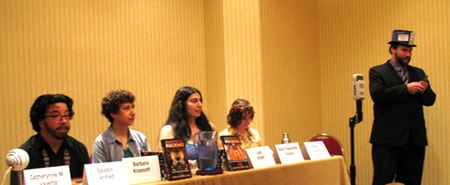Readercon
Stacey Mason

Readercon 2009 reading for Clockwork Phoenix 2. Clockwork Phoenix 3 debuted at this year’s Readercon; editor Mike Allen at right. Photo: Michael Curry cc
Last weekend’s Readercon brought writers, book lovers, and small publishers together to discuss the state of, well, writing and publishing. As Mark Bernstein noted, the conference culture expects that you are a serious reader. Though this culture keeps Readercon free of wannabe panels on “how to find an agent and get published,” it also means that it might be less accessible to casual readers. Still, amidst reports of gender discrepancies among readers, I was happy to see a roughly equal gender spread (however, the one SF panel I attended was woefully male-heavy).
Panels offered a glimpse into the publishing world that —for the most part—seems to be adapting well to the changes in to the book market despite continuing reports that the sky is falling. If even the small presses are doing fine, where is the gloom and doom coming from?
According to several of the panels, the problem is not with the writers or publishers, but with the supply chain: the distributors, wholesalers, and retailers. One publisher commented that they’d had three distributors go out of business in the past year. One panel explored not only what a market might look like without today’s economy entirely, exploring economic approaches beyond the pay-per-copy system.
The digitization of books was heavily felt throughout the conference. Even with the collapse of the supply chain, small presses are able to produce digital books at very low cost for sale through Amazon or directly to the customer. Many publishers reported record eBook sales, though most agreed that formatting is a problem. An additional concern seemed to be the lack of instructions on how to digitize a book correctly, which explains some of the strange page layouts and linking systems I’ve seen on some of the works I’ve downloaded recently.
Though a panel by the delightful Cecelia Tan revealed that much of the work previously done by publishers has shifted to the author (copy editing, proofreading, promoting) a couple of writers in the audience pointed out that they liked having such control over the marketing of their books and did not mind paying for it out of pocket or through time investments. As Tan notes, with the larger publishers, books were rarely getting this kind of attention anyway, and the writers would pay in sales.
And while we’re on sales, the exhibition area was exquisite. It combined everything I love about small bookstores—knowledgeable staff with friendly, personable service, who have actually read most of the books they sell—with the buzz and excitement of a convention. My main caution to anyone thinking of attending next year is to withdraw an allotted amount of cash ahead of time, because the vendor exhibition will call to you, and (quaintly) none of the vendors I spoke with accepted credit cards.
